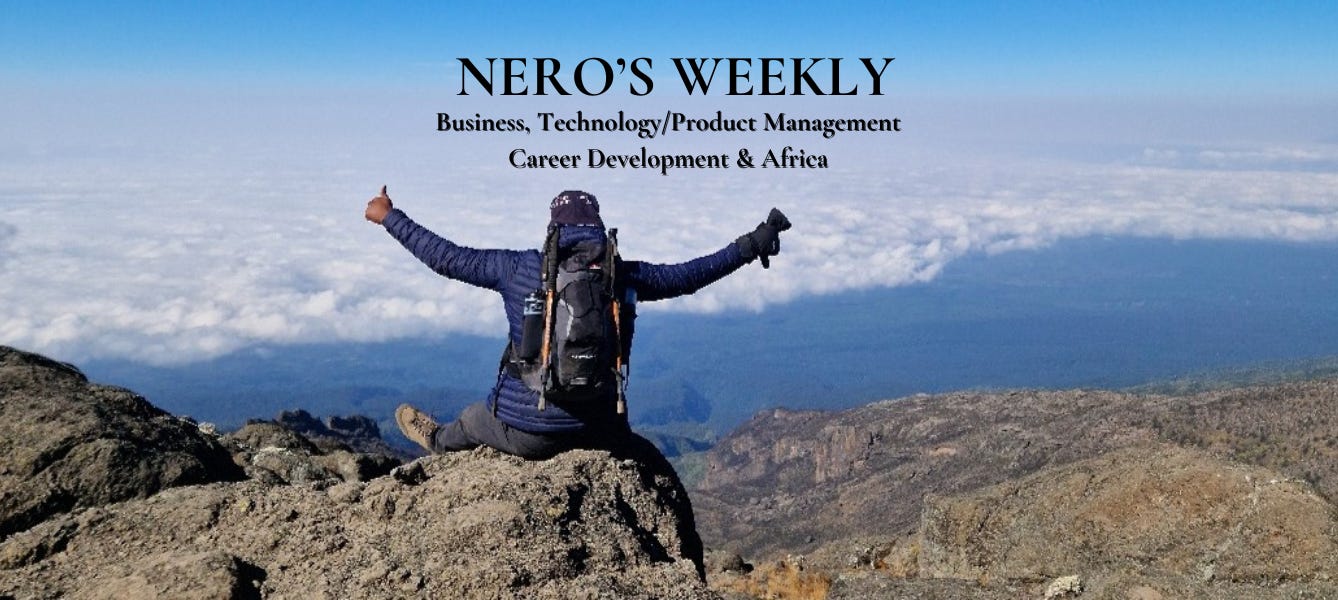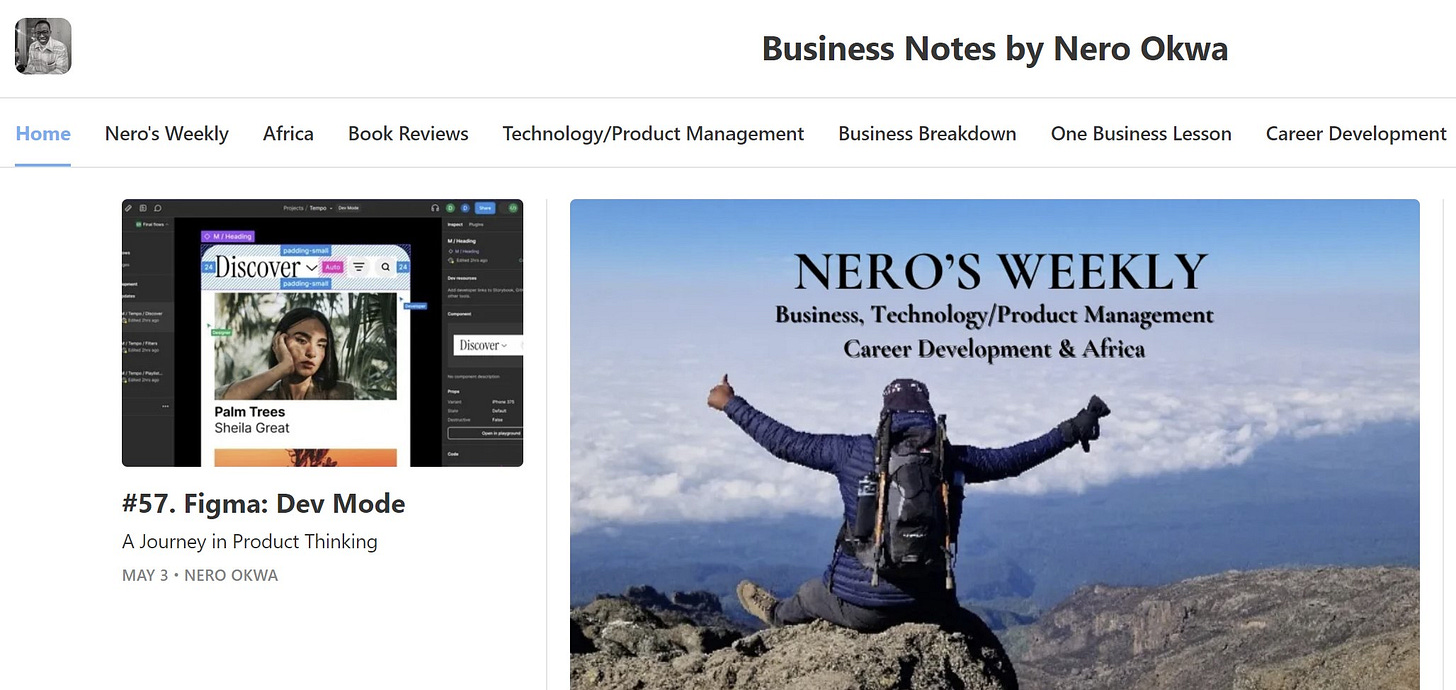#59. Nero’s Weekly
Week 4 - 17/05/24
Dear Reader,
Here is the curated newsletter of the articles, books, and resources I’ve read in the past week. I have updated my newsletter with different sections for better discovery. Check it out!
I have also included a section on AI to cover the exciting new releases by OpenAI and Google this week. Enjoy😊. Last issue.
Nero’s Pick - I enjoyed watching NYU professor Scott Galloway’s predictions for 2024. His big predictions are: TikTok would come for Spotify and Netflix’s market and would be sold to a Western investor, we would reach peak AI valuations (OpenAI), India would be the biggest global consumer class, and Meta’s next growth vehicle would be WhatsApp.
Finally, he is predicting the biggest technology with the most impact would be: GLPI drugs. He cites how every year obesity kills more people (1.5m) in America than Corona virus, and this drug solves this.
AI
OpenAI - The major updates were a desktop app, their latest model; GPT-4o, and the fact that the model would be freely accessible to all users. The significance of this model is that you can communicate with it in real time through voice conversation, video streams, and text. GPT-4 has similar features with this new model, the difference was that they were siloed in seperate models which meant longer response times and higher compute cost. By merging these features in one model in GPT-4o, results in reduced latency, a faster response time, and smoother transition. I enjoyed the live demonstration for language translation and tutoring.
Google – Google had its annual developer conference where it released its newest model; Gemini 1.5 Flash and updates to Gemini 1.5 Pro, a host of new AI-powered features across its workspace like Gmail, and android updates. Gemini 1.5 Flash is the fastest model served in the API and is more cost-effective than Gemini 1.5 Pro. There was also a focus on multi-modality: ‘Both 1.5 Pro and 1.5 Flash come with our 1 million token context window and allow you to interleave text, images, audio and video as inputs’. Here is a 10-minute summary:
Business
Forbes - Notion Takes On Google Docs And Microsoft Office By Being Like Lego - Great interview with Notion cofounder and CEO Ivan Zhao on the story of Notion. He talks about how they were inspired by early computer pioneers like Douglas Engelbart to use computers to augment human intellect. Their insight was that people want to solve the problems Infront of them with whatever available tools, they don’t want to create their own software. “So the insight is that we can give people a software (Notion) to solve their problem and then when they get familiar with it they can use it to solve other problems – like a Lego piece”. Notion has recently released a new calendar for a connected workspace.
Quanta Magazine - The Computer Scientist Who Can’t Stop Telling Stories - In the world of Technology, there are few books held in higher regard than “The Art of Computer Programming," a multivolume set by Stanford professor Donald Knuth. Bill Gates once said 'definitely send me a résumé' if you finish this. In this interview Donald talks about how he combined his love for discrete digital problems and large collections of information to publish volume 1 in 1968. Two expressions that stuck with me from this interview were: “The best way to communicate from one human being to another is through story”, and “A person’s success in life is determined by having a high minimum, not a high maximum”.
Technology & Product Management
First Round - From Flagship Back to Fledgling: Lessons on Going Multi-Product From an Early Stripe PM - In this interview on building multiple products, Tara Seshan draws on her decade long product building experience from both Stripe and Watershed. She shares 9 lessons from her playbook. Here are my top 3: Lesson #1: Choose carefully from the multi-product menu, Lesson #2: Tease out your vision and focus on making the “why now” case, and Lesson #6: Run these highly structured product reviews to stay on track.
Silicon Valley Product Group - AI Product Management - In this article famous product coach; Marty Cagan discusses the challenges for product teams when building AI-powered products. I like how he anchors the discussion using his famous 4 product risks (value risk, usability risk, feasibility risk, and viability risk – see my book review of Inspired) and how they would change with AI. In addition to understanding the effect of incorporating AI (value, risk, trade-offs and uncertainties), AI product managers would need high AI literacy to be successful.
Africa
South Africa - Amazon launches online shopping service in South Africa – The long awaited launch of Amazon in Africa has finally come. The continent’s most advanced economy is commonly seen as the best entry point into Africa. South African customers would be able to shop form a selection of local and international brands. It would be interesting how the existing market leader (Takealot.com) would respond.
Namibia - World Bank Loan to Namibia Supports Renewable Energy Integration - Namibia would receive $138.5 million to improve the reliability of the country’s transmission and enable greater integration of renewable energy. It will be implemented by the national electricity utility; NamPower and is structured around three components: (1) development of the second Auas-Kokerboom transmission line, (2) development of a utility scale Battery Energy Storage System facility; and (3) technical assistance activities to support NamPower to develop bankable renewable energy projects and enhance the socio-economic benefits of their projects.
Career Development
Farnam Street - Why Focusing on What Won’t Change is Key to Long-Term Growth - Shane Parrish writes on how ‘everyone speculates on what the future holds. The question, “What’s going to change in the next 10 years?” but rather, like Jeff Bezos and Warren Buffet a more important question should be “What’s not going to change in the next ten years?’ I like how he ends this article: “While you don’t know what job you will hold in the future, you know you can increase your value by learning more skills… While you don’t know what you’ll be selling in ten years, you know that customers will still want high quality, low prices, and exceptional experience. Positioning over predicting”.
“When you have something, you know is true even over the long term, you can afford to put a lot of energy into it.”
There you have it.
How did you like this article on a scale 0-5? How could it be better? Let me know. You can message me questions or feedback at notesbynero@gmail.com.
If you’re finding this newsletter (nerookwa.substack.com) valuable, consider sharing it with friends, or subscribing if you haven’t already.
Thanks for reading and bye for now.
Nero
Go Further




